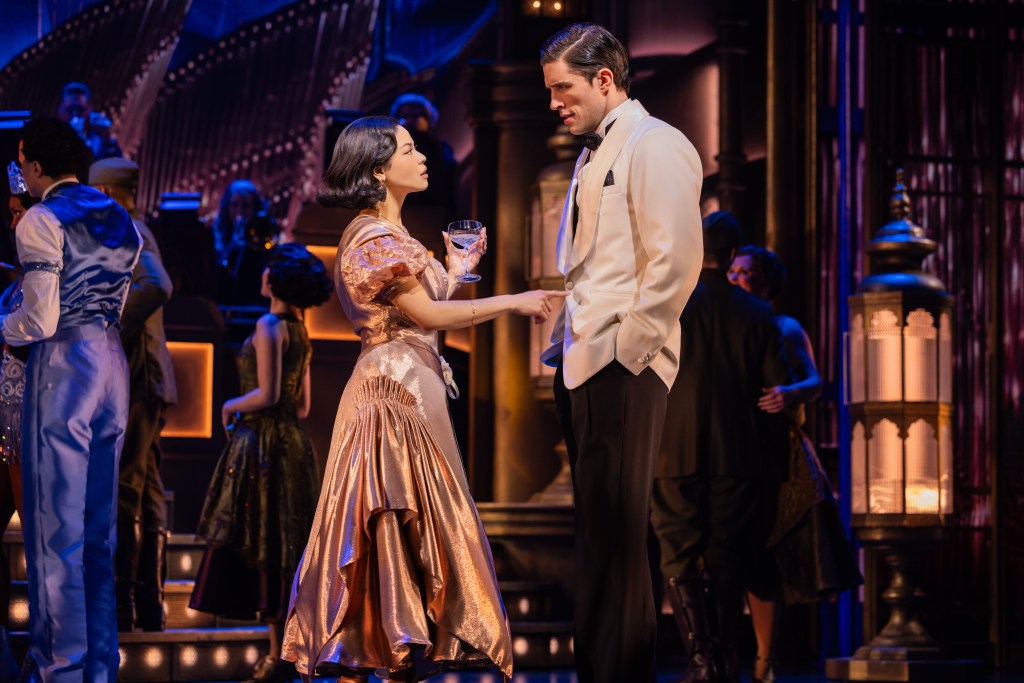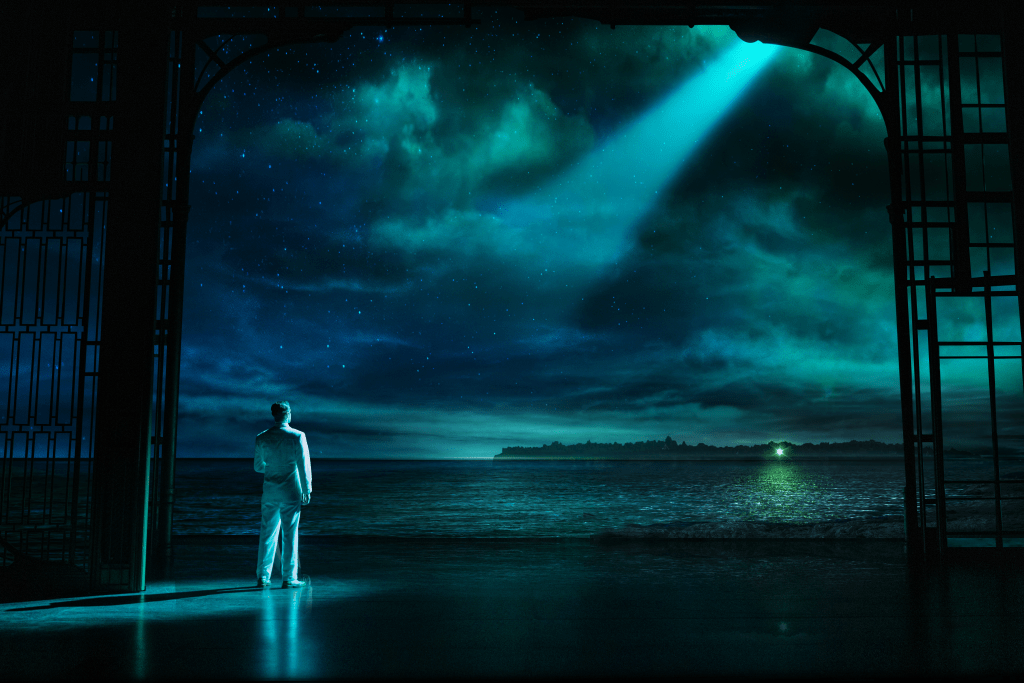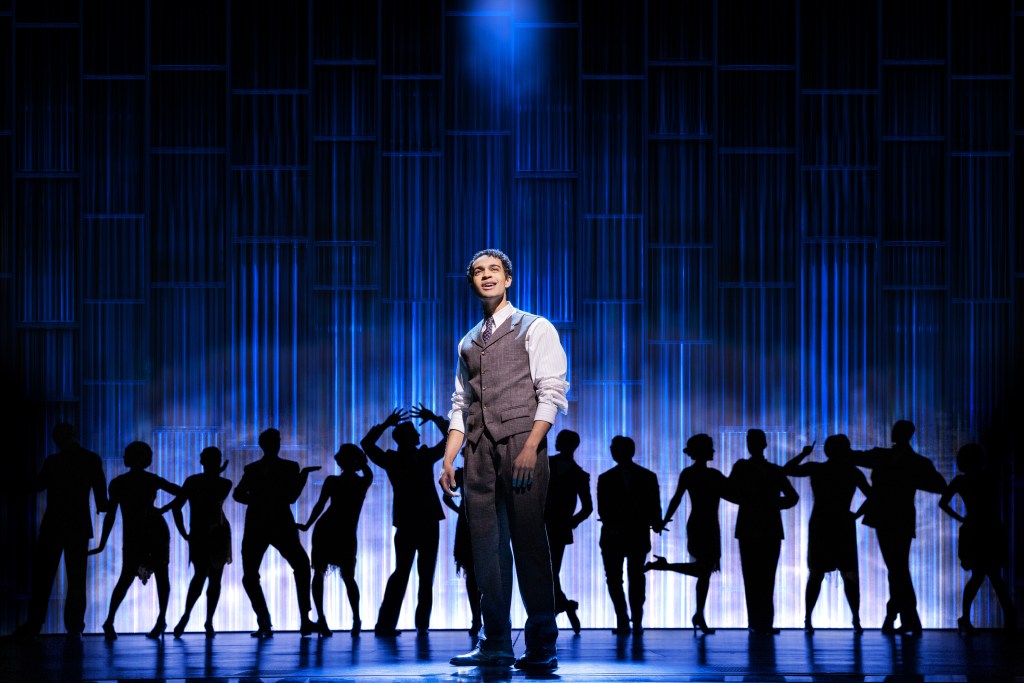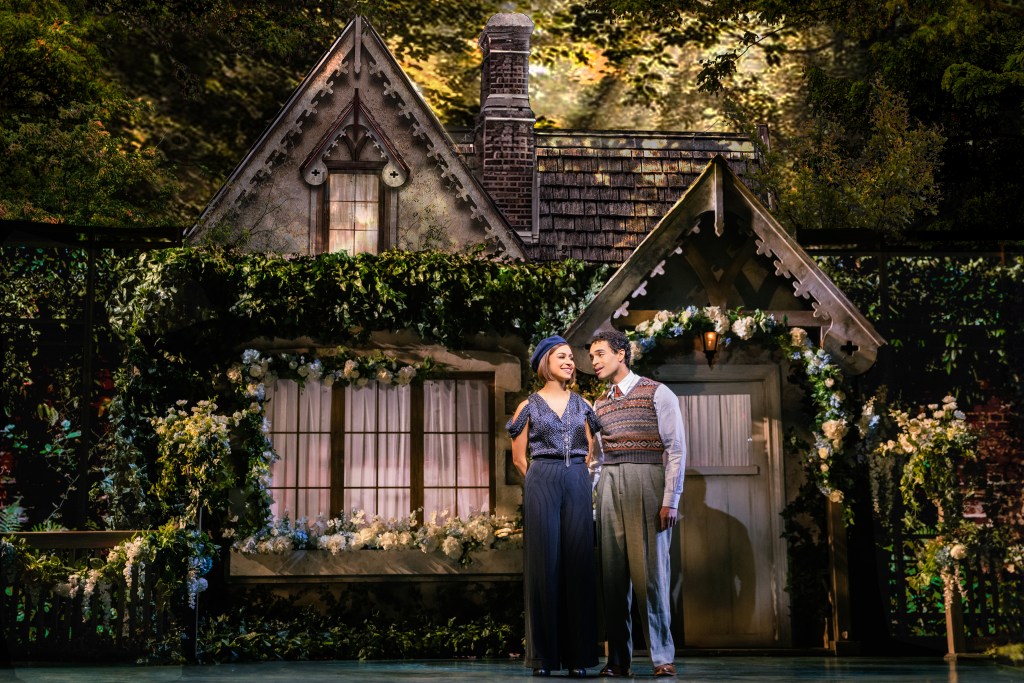The Broadway Theatre Review: The Great Gatsby – A New Musical
By Ross
There he is, just as I remember him from when this new musical adaptation previewed at New Jersey’s Paper Mill Playhouse last fall, dressed sharply in a white suit, staring off into the horizon across the water reaching out for everything he’s been dreaming of. It’s just as we might have imagined the central mythical and titular soul that is, in a way, oddly and quite naturally at the center of this majestically sung new musical, The Great Gatsby. “It’s New York City, folks,” and we are now live, at the Broadway Theatre. The “time is opportune“, especially for this musical extravaganza based on the 1925 F. Scott Fitzgerald novel that we (mostly) all know, and most probably love (even though, as history informs us, this great American novel was not such a financial hit when it was first published).
Running onto Broadway quickly and much improved, before that other adaptation, simply called Gatsby (with music and lyrics by Florence Welch and Thomas Bartlett and a book by Martyna Majok), now premiering in Boston (officially opening on June 5, 2024), makes its way to NYC, this Broadway production, with soaring music by Jason Howland and some sharp lyrics by Nathan Tysen – the team that brought us the powerful but equally earnest Broadway musical, Paradise Square – is dressed in as much superficial gold as that unveiled ensemble that swings and shimmies themselves forward to a defined beat in the house where the party doesn’t stop.
The writing team does not seem to know how to create connecting tension to what the show is swirling around. At least as it opens itself up to us initially. Layering in a few soaring songs made for adoration and wild applause, The Great Gatsby, much like their last Broadway venture, never really finds its continuity or resonance. The songs are not the problem, even when they feel misplaced from some other moment, like that opening number that’s connected to and surrounds the man who should be our narrator. The chorus sings about a party, while the lost transplant is really just interested in finding his place in the chaos. It is made to feel epic and celebratory in proportion, but it is the connective tissue that seems to be the issue in question, especially within the book written by Kait Kerrigan (West End’s The Time Traveller’s Wife). Inside that framework, there is a complication that only cements itself the further we go, as we can’t quite figure out who is actually telling us their story. And through whose bespectacled eyes we are seeing all that transpires, regardless of whether our narrator can or cannot.
This tragic iconic tale of thwarted love and a cursed American Dream, like the Fitzgerald novel and the 2013 Baz Luhrmann movie that I couldn’t get out of my mind while watching this new stage version, should be unmasked through the wide observing eyes of its innocent narrator, Nick Carraway, played absolutely gloriously by the wonderful Noah J. Ricketts (Disney’s Frozen; 2ST’s To My Girls). He should be the epicenter for us all, and with him, we should feel his wide-eyed unpacking from that first moment he lays his eyes on all that surrounds him on the Sound. We must register what it means to him to come from such a uniquely different social class and discover the complications that Nick must inhabit in the deceit-filled lies of those he is connected. It’s his unwinding that we must experience, and when Ricketts’ Nick is given the space to expand his emotional and complex horizons, we feel in our bones the fading of that easy-going optimist that first arrives at that cottage door.
Unfortunately for this new musical stage adaptation, that wide Broadway stage has continued to have a hard time keeping its attention focused on his collision with the decadence and indifference of the world that, at first, engulfs him. There are too many storytellers here. Yet, in all those different vantage points, the story is essentially told efficiently, but not in the most emotionally engaging manner. Wisely, this production does have is its eyes fully aimed and refocused on the two star-crossed lovers that ultimately come and crash together leaving quite the mess discarded on the side of the road. It is Nick’s ultimate disappointment in those around him that plays the bigger part of the causality list. But no wonder that we aren’t as engaged with that emotive theme, as the music and the lyrics have been created to give this production’s two leads a tremendous number of opportunities to showcase their true undeniable talent. So how can we look the other way?
Jeremy Jordan (Broadway’s Newsies; American Son) as that captivating titular character, Jay Gatsby, steals the spotlight without question, and in a way, becomes the one who will lead us through this emotional upheaval. Without a doubt, he is given the most spectacular moments to vocally shine as magnificent as the world he has created around him, courtesy of the very (almost too) geometric sets (and projections) that have been pulled together by designer Paul Tate DePoo III (Broadway’s The Cottage) with distinct lighting by Cory Pattak (Broadway Center Stage’s Next to Normal).
The glittering visuals and the impressive vocals displayed by our star leads are forever rich and dynamic. Jordan has never sounded better, with Eva Noblezada (Broadway’s Hadestown) matching his stellar performance every step along the way, although we know to hold back emotionally from this woman. There’s an emotional disconnect inside her casual indifference that red flags her. But in regards to their vocal pairing, it is perfect and masterful, finding clarity and distinctiveness in every sophisticated nervous attempt for connection and renewal. Their vocals shine and sparkle within every song they are gifted. But the ultimate question remains: does it work for the story being told?

Noblezada does find her shimmering soldier love story inside every song she sings, lifting herself up high and digging herself in and away from the enchanted life she has been trying to cultivate with her handsome, old-moneyed, brutish husband, Tom Buchanan, played perfectly by John Zdrojeski (Broadway’s Good Night, Oscar). The framework is all there, centered around the clash between new and old money, honesty and deception, and even some gender dynamics, most impressively embodied by the impressive Samantha Pauly (Broadway’s Six) as the wonderfully sharp, lady golfer, Jordan Baker. That character magnificently rises above it all, almost stealing the whole crown away from everyone else. She swings that club and knocks those balls far and away with force, forever delivering fascination and excitement within her character and her strong voice. She is a magnetic force to be reckoned with on that stage, bringing energy and excitement to every scene she inhabits, even when she swerves to the left.
Inside the minimal amount of handwringing that happens when Jay and Daisy meet up once again outside Nick’s cottage for a little bit of tea, the story, even with that sometimes choppy dialogue, drives forward at a neck-breaking speed. But somewhere along the road, these three super talents, basically steal the show away from our well-toned narrator, pulling us quickly into Jordan’s fascinating superficial stance, and Jay and Daisy’s fantasy romance without even trying all that hard. It’s Kerrigan’s book that is the main culprit, driving us away from Nick without anyone really kicking up much of a fuss.
It’s a bit of a frustrating recentering, that works well for the roaring love party of the show’s two stars sparkling brightly in the center. But not so well for the overall melodrama. The two bedazzle us with their magnificent, vocally perfect romance, thanks to the fine work done by music director Daniel Edmonds (Broadway’s Shucked) and sound designer Brian Ronan (Broadway’s Some Like It Hot). Yet, it pushes the humanistic themes of disillusionment somewhat to the side of the road, leaving the spectacled poster eyes staring out into the audience with a look that seems to be saying, “Where did we lose our way?” Was it on our way to the Met? (Now that was a fun, well-staged moment.)
The same question could be asked of that other couple that finds themselves caught in the spectacled gaze of that ominous sign on the road to the city. That eyeglass symbol and metaphor are infinitely better addressed and unpacked in the novel, but here, in the show’s off-balanced storytelling, those eyes just hang there staring back at us, almost distracting us from the fine work done by Paul Whitty (Broadway’s Come From Away) as gas pump owner George Wilson, alongside his cheating wife, Myrtle, played deliciously wild and wicked by Sara Chase (Netflix’s “Unbreakable Kimmy Schmidt“). These two are given some pretty amazing moments of vocal shining and emotional unburdening, but once again, whose story is this really? And do we really need a big powerful ballad from Myrtle, regardless of how well she sings it, about her pregnancy just before that somewhat clumsy climax that we all know is coming around the corner?

As directed with a stereotypical but never still stance by Marc Bruni (Broadway Center Stage’s The Music Man), The Great Gatsby musical is ushered forward in a pretty straightforward approach. Bruni seems to always want to bring everyone down centerstage for their big musical moments, singing loud, strong, and true most magnificently in a spotlight, framed in squares by everything behind them. But they do find some lovely angles and flair in the fine, but sometimes overly done costuming by Linda Cho (Broadway’s Summer, 1976) and the jazzy sharp choreography by Dominique Kelley (Ebony Rep’s Ain’t Misbehavin’) that breaths life into some stilted moments, even if they feel forced and flippant.
It’s all so geometrical and classic in the way this rendering has been staged. It feels a bit too direct, even when we are caught up in the hot hotel drama inside the fantasy. I almost wanted a more experiential telling from the maestro who brought us Moulin Rouge! the Musical on Broadway. It needed that level of focused imbalance and involvement. And speaking of Moulin Rouge!, I also craved that intense and frenetic energy that Luhrmann brought to his cinematic retelling of this great American tale. The fascinating thing about that comparison is that regardless of how spectacular the music is in this Broadway version of The Great Gatsby, the pop music score of Luhrmann’s version almost feels more in tune with the period than this original score. And more memorable. Especially in the party scenes at that grand house. Something in this musical’s pop-jazz fusion feels more standardized and out of touch than the jukebox score of Luhrmann’s film. It’s ironic actually, that his film delivers a party that I don’t want to leave. Unless Pauly’s Jordan is my companion. Because if that was the case, I’d go to any party that character invited me to. Without a single doubt or hesitation.





[…] featuring Tatiana Kahvegian, The OutsidersPaul Tate dePoo III, The Great Gatsby (includes projections)Riccardo Hernández, SuffsArnulfo Maldonado, Dead Outlaw Grace Smart, Good […]
LikeLike
[…] Ayite, Hell’s Kitchen Linda Cho, The Great GatsbyDavid Israel Reynoso, Water for ElephantsTom Scutt, Cabaret at the Kit Kat ClubPaul Tazewell, […]
LikeLike
[…] New Broadway MusicalDays of Wine and RosesSuffsThe Great GatsbyThe OutsidersWater for […]
LikeLike
[…] We Roll AlongTobias Menzies, The HuntCynthia Nixon, The Seven Year DisappearEva Noblezada, The Great GatsbyKelli O’Hara, Days of Wine and RosesLeslie Odom, Jr., Purlie Victorious, A Non-Confederate Romp […]
LikeLike
[…] 🏆Paul Tate dePoo III – The Great Gatsby […]
LikeLike